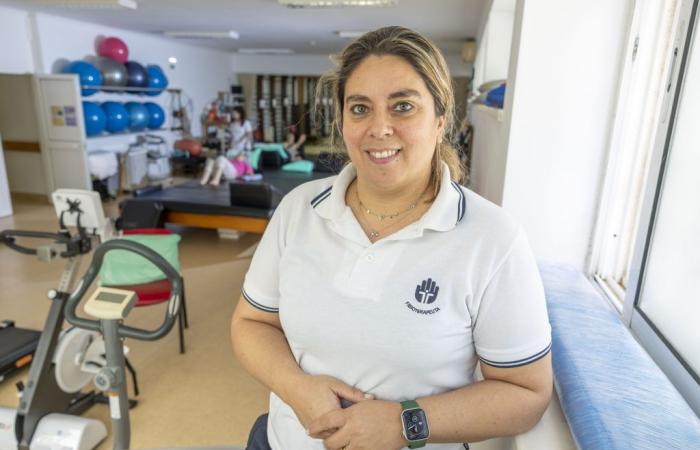The World Health Organization (WHO) has been recommending that physiotherapists prepare themselves, in accordance with the training paths of their countries, to be able to join multidisciplinary teams that work in contexts of emergency, catastrophe and humanitarian action. In the United Kingdom, Australia and the Netherlands this is already possible, in Portugal it is not yet possible. On the contrary, “in our country there is still a notion and a perspective that diminishes Physiotherapy as its science, its area of study and intervention”, explains Carla Gentil Homem, physiotherapist, director of an activity center in this area and coordinator of the first postgraduate course in Europe in Physiotherapy in the Context of Emergency, Catastrophe and Humanitarian Action, even defending: “We need to change the paradigm.”
A change that is even more important now, because Portugal has become a pioneering country in training with the first European postgraduate course in this area – which has been taught since April 11th, ending at the end of the year, at the Escola Superior de Saúde do Alcoitão (ESSAlcoitão), Santa Casa da Misericórdia de Lisboa (SCML) – with the approval of the WHO. At the moment, it has 21 students, there is already a waiting list for next year and the WHO itself has already launched the challenge so that it can be multiplied in other countries.
But why doesn’t the paradigm change in Portugal? Carla Gentil explains: “There is a great duality in the concept of medical emergency, that of life or death, which means that they are only present in these professional contexts that are clearly trained to save lives”. But the WHO itself “already contradicts this concept, demonstrating how wrong and outdated it is”, he argues, exemplifying: “In the pandemic, we all realized that it was not enough to save lives, that it was not enough to have a beating heart to save and recover a life. It is a fact that physiotherapists do not use an invasive practice, they do not intubate patients, but movement is part of life and Physiotherapy is the specialist science in this area. And the sooner we intervene in patients who lose mobility, whether because of Covid-19, a road accident, a stroke, surgery, cardiac arrest or any other situation in which movement is interrupted, the greater the the patient’s ability to successfully recover. And when we talk about saving lives and recovery, we talk about the patient’s reintegration into the family, work and society”, highlights the 52-year-old technician, who says she is a physiotherapist by passion and vocation. “It’s the only profession I see myself working in.”
It was through this passion that he decided to invest in his training and move towards completing a master’s degree at ESSAlcoitão and choosing an area for his thesis, which he had already identified as a failure at national level, and which was precisely, the integration of physiotherapists in multidisciplinary teams.
There were more than two and a half years of work in which “I wanted to know why our intervention in medical emergencies, catastrophes and, consequently, in humanitarian action was prohibited. What could be missing in the academic training of physiotherapists was one of the questions, another was understanding the extent to which it made sense to invest in this training so that we could be part of these realities. And we did a study on what was happening in other countries: in the end, we realized that what was needed was another concept of Physiotherapy, as an autonomous science and with its own skills to be an autonomous profession.”
In fact, it is from this thesis that the idea of moving on to the creation of postgraduate courses, already considered pioneering, comes from. But, he explains, “it’s not about us wanting to work alone, nor about replacing any other professional, what we want is autonomy in our practice and being an integral part of multidisciplinary teams, because we have a contribution to make that has been highlighted and demonstrated by the WHO itself.”
For example, “at this moment, we no longer hear about covid-19, but physiotherapists continue to work daily with these patients, given the impact of the consequences”. For this reason alone “the physiotherapist should have a place in the emerging situation, because he can identify situations and propose interventions”.
Another contribution that Carla Gentil Homem highlights as evident is in the area of Sports. “It has already been realized that the physiotherapist’s contribution to improving an athlete’s performance is extremely important, whether by reducing injuries or by early recovery from them”, even saying, in a joking tone: “Cristiano Ronaldo doesn’t go on holiday without your physiotherapist. And in the United Kingdom, when a football player goes to the ground, the first person to enter the pitch is the physiotherapist”, she says.
In Portugal, this is still not the case, in Sports, in health units, or in Emergency Services, which for Carla Gentil Homem “would have many advantages and less costs in the recovery of patients and for the system. We could be supporting the area of Orthopedics, for example”. But not only.
“How many times in the centers where I work do we receive calls from family members of stroke victims saying that they are going to be discharged and that they need physiotherapy care. And we have to explain that first you have to go to your family doctor, ask for a credential, then go to a Physiatry consultation at the hospital and only then do you get physiotherapy care. When the patient begins to recover, we have already lost a lot of time and this has its costs for the patient and the system.”
Carla Gentil tells DN that there are around 13 thousand professionals registered with the Order of Physiotherapists, but, of these, only 1200 are in the National Health Service and this “should also change for the good of patients and to reduce costs and time waiting time to access healthcare.”
The technician, who says she will never give up on her passion, recognizes that “Physiotherapy is a recent profession, our order has only existed since 2019. Until now it was necessary to regulate the profession so that the physiotherapist’s act was well defined, but the The next steps must be to defend the profession with those who deserve it and to make ourselves heard as a positive contribution to improving health conditions”.
Tags: Physiotherapists join emergency catastrophe teams recommended
--





